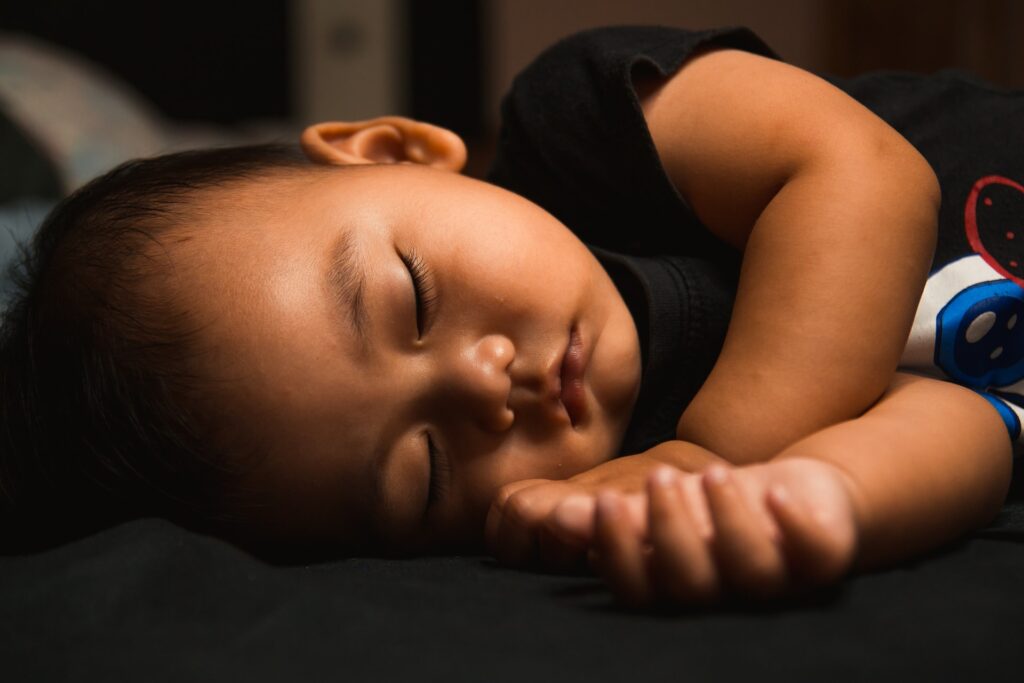8 Tricks On How To Make A Kid Sleep Fast

Having a child who struggles to sleep is at the top of the I-can’t-take-it-anymore parenting list, right up there with fussy eating and toilet training.
You fight the good fight every day, trying your utmost to get your child to sleep.
It’s a difficult and draining task for many parents, but there’s a lot that can be done to assist or “force” a child to sleep. And there’s one aspect of the jigsaw that’s frequently ignored…
Table of Contents
Why do some children have difficulty sleeping?
Knowing how to help your child sleep – and reclaim your life – begins with understanding why the problem exists in the first place. Because a minor modification in your routine may sometimes have a big influence on how effortlessly your child goes asleep. These are some prevalent, yet frequently missed, causes of poor sleep in children (and adults!).
Too much sleep
Does this seem obvious? It’s simpler than you think to ignore this, especially as our children grow into toddlers, preschoolers, and even school-aged youngsters. This is because the amount of sleep they require is always shifting.
A three-year-old does not require as much sleep as an 18-month-old, and a long afternoon nap may mean that they are not ready for bed at 8 p.m. For more information on how much sleep your child need, visit How Much Sleep Does My Child Need?
Too little sleep
While it’s natural to assume that tired children will sleep faster, this isn’t always the case. Instead, when they are overtired, it is difficult for them to move their minds out of the overdrive mode in which they have been functioning.
Diet
If your child is within the acceptable age requirements and still isn’t sleeping, consider adjusting their bedtime earlier. It could even help kids fall asleep faster!
Food allergies or sensitivities, believe it or not, can make it difficult for a kid to fall or remain asleep during the night. If your kid has difficulties sleeping on a continuous basis, keep a food journal to see if you can see any trends, such as “every time Suzie has dairy, she has a horrible night’s sleep.”
If the problem persists every night, consult your doctor about potential testing or a short-term food elimination diet to identify a likely culprit! Dr. Amy Myers explains more about food sensitivities and how to treat them.
Screen time
While children may sit quietly and enjoy watching a show or playing on their tablet, the action and light from the displays can actually keep their minds incredibly alert and prevent them from feeling drowsy. They may have even more energy after screen time! If screen time is part of your night ritual, you might want to try removing it for a brief period of time before bedtime. More on the link between sleep and screen usage may be found here.
At the same time, and I say this without judgment, if your child has had a lot of screen time during the day, even if it’s not before bed, they probably haven’t had enough physical activity and won’t feel weary.
Sensory
And, by sensory, I mean I’m referring to sensory processing. That is, how our children absorb information from their seven senses (including proprioception and vestibular) in their minds. While it is sometimes overlooked, if a youngster isn’t processing sensory information properly, it might throw them off.
Sleep may be severely impacted when there are sensory processing issues, which affect much more children than most people know. Most of us take calming our bodies down enough to sleep for granted, but doing so for a child who requires more or less sensory input can be exceedingly difficult.
How To Make A Kid Sleep Fast?
Cool down the room.
A dip in body temperature in the evening signals it is time to retire for the night. We would have naturally felt the air chill as the sun went down before homes were insulated with settings that could be adjusted at the press of a button.
This external cooling assists your body in making the 2-3 degree adjustment in core body temperature that occurs during the night. You become less attentive when your body temperature decreases. Your metabolism also slows, which reduces appetite at night.
Being too warm at night, aside from being a risk factor for SIDS, makes it harder for your child’s body temperature to decrease. At night, aim for a room temperature of 65-70 degrees.
Don’t underestimate the impact that a few degrees may have on the quality of your sleep.
To keep your child warm, clothe in breathable materials and use a sleep sack instead of a blanket until your child is old enough to sleep with a blanket on (usually not until around 3 years old).
You may also warm your toes before going to bed. Several studies have revealed that keeping your feet warm before night assists your body’s core to cool efficiently, luring you to sleep.
Turn down the lights.
The fading light of the evening sun, with its warm, reddish color, signals your body to begin producing the sleep hormone melatonin. Although melatonin does not cause sleep, it is a crucial component of sleep. Melatonin may be thought of as the orchestra conductor for the body, signaling to each system that it is time to begin the symphony of the night. (Are you humming the Phantom of the Opera tune now?)
Once again, contemporary living has significantly altered the normal schedule of sleep. Before the light bulb, the only way to see light after the sun went down was by using firelight.
Given how strange it is to have strong light after sunset, it is understandable how much artificial light alters the body’s sleep routines.
Your home’s lights are usually approximately 200 lux, depending on the size of the space and the brightness of the light bulbs you’re utilizing. In a group of young adult volunteers, this level of light delayed the initiation of melatonin by roughly 90 minutes when compared to a dim 3 lux condition.
At night, little children may be more sensitive to light. As bedtimes go later, more evening light exposure occurs, delaying the start of a child’s internal clock.
The issue is that sunshine in the morning keeps your child’s wake time fixed. In other words, the light your child is exposed to in the evening, especially if bedtime is too late, may be artificially postponing your child’s natural bedtime while also reducing your child’s night of sleep—rather than pushing the entire sleep period later.
To prevent disrupting your sleep, a rising number of smart bulbs, such as the Philips Hue or the Lighting Science Good Night Light, allow you to customize the color and intensity of the light. Keep the room as dark as possible after your youngster is in bed for the night. Even with our eyelids closed, light has an impact on our sleep.
Switch off the displays.
Television, video games, tablets, laptops, and cell phones I understand how difficult this is. If you use electronic gadgets to help your children quiet down in the evening (and to give mom and dad a break! ), you are not alone. However, the link between all of these devices and sleep is strong.
Electronic media is enticing. No youngster in history has ever expressed a desire to quit watching their favorite TV in order to sleep! Even if you are successful in convincing your child that it is time to go to bed, it is difficult for their thoughts to quiet down and relax.
Have you ever spent a night curled in bed, ready for sleep, but you couldn’t turn off your brain? That is exactly what is happening to your child. It’s like attempting to go from a green to a red traffic light without the yellow signaling that it’s time to slow down. Switching off displays provides that slow-down buffer.
Penn State University researchers discovered that children who watched TV or played video games before bedtime slept 30 minutes less than children who did not. Those who used their phone or computer before bedtime slept an hour less than those who did not.
Establish a nighttime routine.
This may not appear to make much of a difference in how easy your child goes asleep, but you’d be surprised—actually it’s one of the most potent things you can employ.
A recent research looked at how a basic routine of a warm bath, massage, and a peaceful activity (book, song, prayers, etc.) improved the sleep of children aged 8 to 18 months who had a sleep difficulty as indicated by their parents.
There was a considerable amount of change in just three nights. The sole variation was beginning this nightly regimen; there was no sleep training.Children began falling asleep faster, waking less frequently and for a shorter length of time when they did wake, and sleeping more in general. Not only that, but moms said that bedtime was simpler, their children’s sleep quality was improved, and their children were happier.
Patterns help children learn. A bedtime routine that occurs in the same order every night provides your kid with the consistency they require to relax and slumber.
Examine your timetable.
Naps taken too late in the day will interfere with your child’s ability to fall asleep at bedtime. As a general rule, if your baby is still having a third nap, strive for the nap to stop by 5pm, two naps by 4pm, and one nap by 3pm.
If your kid is older than 24 months, naps will begin to limit the duration of sleep your child receives at night, making it less likely that you will have the 12-hour nights you may have enjoyed when your child was an infant.
By the age of three, most youngsters are sleeping for roughly 12 hours each day.
If your preschooler is still sleeping, you might be looking at a 9-10 hour night sleep. Those with childcare schedules may have to accept a later bedtime-or speak with your provider to see if a quiet time option may be given lieu of the nap.
You want to identify the best bedtime for your child after considering their age and sleeping habits. This requires some investigation. If you put your child to bed too early, you may discover that he spends an hour in bed before his body is able to go asleep. In this scenario, the remedy is straightforward: postpone bedtime.
However, if you put your child to bed much later than his body requires, you will discover that the idea of a second wind is true: instead of winding down, your youngster will wind up. Children who go to bed after 9 p.m. take longer to fall asleep and wake up more frequently, and they receive 1.3 hours less sleep than toddlers who go to bed before 9 p.m. If your current bedtime is at 9 p.m. or later, adjusting bedtime earlier may help your child fall asleep faster and have a more peaceful night.
Improve your child’s sleeping confidence.
If you’ve done everything indicated above, this is most likely your stumbling block. Many children develop a habit of leaning on their parents to help them fall asleep. Your presence has become entangled with your child’s sleep, whether it’s breastfeeding your newborn to sleep or sitting in the room with your toddler until they fall asleep.
The problem arises when your youngster realizes you’re intending to slip away after they’ve fallen asleep. Your child awakens later, you are not present, and terror ensues. Little ones become hyper-aware of your presence as a result, battling sleep to ensure you don’t go.
Sleep is an act of faith. You are an important part of your child’s ability to sleep soundly. Your youngster must understand what to expect.
To correct this, you have two options: stay with your kid as they sleep and stay with them all night-or devise a strategy to help your child understand that he or she is secure, loved, and capable of falling asleep alone.
In any case, your child should know what to expect: no sneaking out of the room or delicately sliding your baby into the cot after they’ve fallen asleep. Your youngster deserves a consistent sleeping environment. This is how you will raise his confidence, restore his trust, and alleviate his fear about the situation.
Communication
Talking to older children (5-8 years) before they sleep is vital since school might be difficult and they may be experiencing worry. Anxiety has been linked to sleep deprivation, so if your child is having trouble sleeping, this might be the cause. Discuss school or anything else that you feel is bothering them. Even if a solution is not accessible, talking is beneficial and may result in better sleep.
Exercise
According to a study performed by Monash University in Australia, exercise is not only helpful for remaining healthy, but it is also good for sleeping well. Make sure your children get ample nighttime playtime. Playing outside is a terrific kind of exercise, but your children will not recognize it as such. This is one strategy that you can use even if you don’t have any reminders!

Takeaway
Sleep is essential for brain growth, and if your children sleep on time and get enough rest, their brain will be active throughout the day. Because they require 10 to 13 hours of sleep each day, the aforementioned guidelines should assist in achieving the necessary result.


















![Nectar Premier Copper Mattress Review In 2022 [Updated]](https://www.myspacebeds.com/wp-content/uploads/2022/09/Nectar-Premier-Copper-Mattress-Review-In-2022-Updated.jpg)

![Silk & Snow Hybrid Mattress Review Should You Buy It Or Not [2022]](https://www.myspacebeds.com/wp-content/uploads/2022/11/Silk-Snow-Hybrid-Mattress-Review-Should-You-Buy-It-Or-Not-2022-520x293.jpg)
